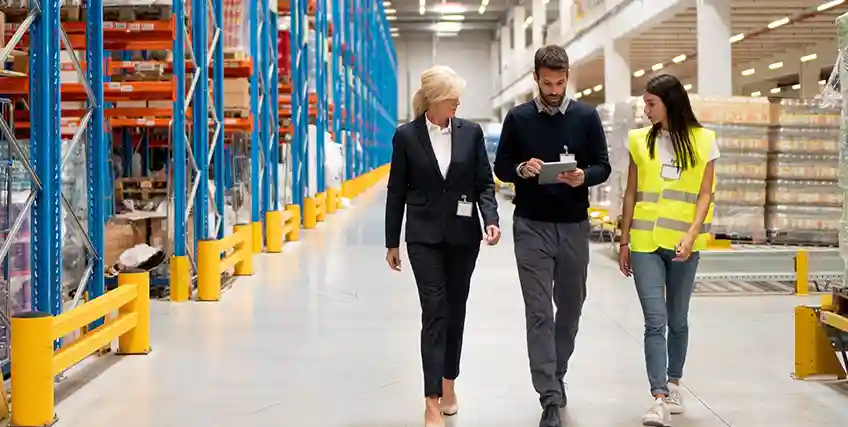Best Loans for Inventory, Equipment & Upgrades in Warehousing
December 02, 2025 | Last Updated on: December 02, 2025

Covering your costs during the slow season allows you to make necessary inventory purchases and business upgrades even when your business doesn't make as much money as it does throughout the rest of the year. Commercial warehouse lending gives you access to cash whenever you need it for all your business needs.
If you’re looking for commercial warehouse lending, explore your different borrowing options. You might need a commercial warehouse line of credit to streamline cash flow, buy necessary equipment, add to your inventory, or make essential upgrades to your business.
Your needs determine what type of commercial warehouse lending you should get. Some borrowers might need a commercial real estate line of credit, while others may want to explore mortgage warehouse lending on the secondary market. Look into all your choices before you decide which commercial warehouse lending option is right for you.
Some businesses need a little extra help to streamline expenses. If your company doesn’t make the same amount every month or experiences irregular earnings during different seasons, you may want to find a lender to cover your business needs.
What are inventory loans?
Staying on top of trends and consumer demands could be your key to success. As competitors fall behind, you can use inventory financing options to cover needs regardless of profit or income. You may want to explore the best inventory loans and lines of credit — a revolving credit line, similar to a credit card — for your business.
An inventory loan is a financing option that borrowers can use for any number of needs, like working capital or buying extra inventory to store and use when necessary. Some inventory loans are good for immediate needs, and you can pay them off in the short term, while others offer long-term repayment to the lender over a few years.
Inventory loans might work for companies that need to store a lot of inventory in a warehouse facility or other storage facilities, like large wholesale retailers or small businesses that store inventory off-site.
What are equipment loans?
If you’re just starting your business, you might need to purchase some equipment before selling a product. Companies that have been around awhile may want to use an equipment loan to upgrade or replace existing equipment that no longer works.
Equipment loans cover a wide range of different needs for various industries. Your company may need a small loan to pay for equipment repairs or startups may need an equipment loan to buy a few vital pieces before launch.
In most cases, the equipment serves as collateral to secure the loan. It’s a good option for startups that may not have a strong business credit score to borrow another type of loan. If a borrower fails to make on-time payments to the lender, the equipment gets seized by the lender until the loan is paid in full.
Your eligibility comes from your credit score, business history, the type of equipment you need, and proof of revenue. Eligibility also determines how much money you’ll get approved for, interest rates, and repayment terms. Different lenders have different requirements, so you may get approved by one lender and not another.
What is commercial warehouse lending?
A warehouse line of credit for commercial lending allows borrowers to take out a revolving line of credit to cover short-term funding to independent mortgage banks — or IMBs — for those banks to originate mortgages and repay advances from the warehouse when loans are sold. Rather than mortgage bankers and other financial institutions use their own funding, they use commercial warehouse lending to cover lender needs.
A commercial warehouse line of credit is designed for IMBs and mortgage originators by offering residential mortgage loans sold on the secondary market. It’s a good choice for companies that buy and invest in warehouse properties.
This type of commercial warehouse lending may be the right fit for certain businesses, but not all companies need a commercial warehouse line of credit. If you’re looking for commercial banking options, real estate loans, or another type of warehouse loan for your business, you may want to explore other choices outside of traditional commercial warehouse lending.
Alternatives to commercial warehouse lending for inventory and equipment
Other borrowing options exist outside of a commercial warehouse line of credit to cover your business needs. Before you complete a loan application, go through all your choices to see which one fits you best.
1. SBA loan
An SBA loan is a loan funded by the U.S. Small Business Administration. The SBA backs these loans, funded through partner lenders, online banking, and other financial institutions. A few types of SBA loans are available, depending on your needs, allowing you to borrow anywhere from $500 to $5.5 million.
While SBA loans are government-backed loans, these are different from FHA loans from the Federal Housing Administration.
2. Equipment leasing
You can opt for equipment leasing rather than take out an equipment loan to make a purchase.
This financing option lets you lease a piece of equipment or the part that you need. You’ll make payments on your lease similar to a vehicle lease. Depending on the terms of your agreement, you can either buy the equipment outright for the remaining balance at the end of your lease or return it when the terms end.
This might be a good choice if you have a very tight budget or are looking for a less expensive option than equipment financing.
3. Business line of credit
Rather than borrowing a different loan for each purpose, you can opt for a business line of credit. You can tap into your line of credit whenever you’d like for all your business needs, whether it’s boosting inventory, buying equipment, or making necessary upgrades.
Once approved, you can make real-time withdrawals to cover purchases. This might be a better option for those who want to finance a few different business needs or those who don’t want to go through the loan origination process, which might take longer to get funding.
4. Short-term business loans
If you only need to borrow a little cash to hold you over, explore short-term business loans. These financing options allow you to get money quickly, but tend to come with high interest rates or more fees than other types of loans.
Short-term business loans are a good option if you are in a bind and need to cover cash flow immediately. These loans are available from credit facilities, including banks, credit unions, and online banking lenders.
The Bottom Line
There’s no one-size-fits-all financing option. Because of this, try exploring as many commercial warehouse lending choices as possible. If there isn’t one that fits the bill, consider looking through commercial warehouse lending alternatives, like equipment leasing, a business line of credit, or an SBA loan.
FAQs about commercial warehouse lending
What is the difference between warehouse financing and warehouse lending?
Warehouse financing allows you to borrow a secured loan that uses your warehouse inventory as collateral. Commercial warehouse lending is a way for banks and mortgage lenders to issue loans without tapping into their capital.
What is the difference between retail lending and commercial lending?
Commercial lending targets businesses for different needs, like building or renting property, raising funds for business needs, or offering loans through their company. Retail lending is more for individuals and the public, like consumer or personal banking.
Is a warehouse of funds a short-term lending arrangement?
Commercial warehouse lending is usually short-term, with repayment terms ranging from a few weeks to a few months. It’s different from traditional lending, which could go as long as a few years, or mortgage loans, which can last a few decades.
Can you get a commercial loan with no money down?
Sometimes, you can get a commercial loan with no money down. There’s a chance you may need to provide collateral to secure your loan. For inventory or equipment loans, the inventory or piece of equipment can act as collateral in case you fall behind or miss payments on your loan.
How much money can I borrow for a commercial loan?
Your approved amount depends on a few different factors, including your lender, what you need the loan for, your credit history, and expected repayment timeline. There are various pricing options for all types of loans.




